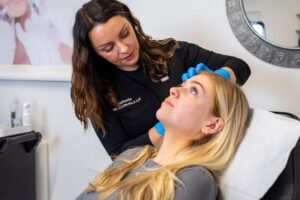Polynucleotides, a type of biopolymer composed of nucleotide monomers, have recently garnered attention in the field of aesthetic treatments due to their promising capabilities in skin regeneration and rejuvenation. These polymers, naturally occurring in the DNA and RNA of cells, play a crucial role in cellular functions such as protein synthesis and cellular repair. When applied to aesthetic treatments, polynucleotides can enhance the skin’s appearance by promoting healing and revitalisation at a cellular level.
One key mechanism by which polynucleotides work in aesthetic treatments is through their ability to stimulate fibroblast activity. Fibroblasts are cells within the skin that produce collagen and other extracellular matrix components essential for maintaining skin structure and elasticity. As we age, fibroblast function diminishes, leading to decreased collagen production and the onset of wrinkles and sagging skin. Polynucleotides can counteract this process by activating fibroblasts and enhancing collagen synthesis, thereby improving skin firmness and elasticity.
Another significant benefit of polynucleotides is their potent anti-inflammatory properties. Inflammatory processes can lead to various skin issues, including acne, eczema, and redness. Polynucleotides help mitigate these conditions by modulating the skin‘s inflammatory response and encouraging tissue repair. By reducing inflammation, polynucleotides not only promote a clearer complexion but also create a more conducive environment for overall skin healing and rejuvenation.
Furthermore, polynucleotides exhibit notable wound healing properties. They can accelerate the repair of damaged tissues and promote the formation of new blood vessels, a process known as angiogenesis. This is particularly beneficial in treatments designed to address scars, stretch marks, and other skin imperfections. Enhanced blood flow to the affected areas ensures that essential nutrients and oxygen reach the tissues, thereby speeding up the healing process and improving the overall texture and appearance of the skin.
In aesthetic treatments, polynucleotides can be administered via various methods, including mesotherapy, topical applications, and injection. Mesotherapy involves the injection of polynucleotide-rich solutions directly into the dermis, where they can exert their regenerative effects most efficiently. Topical applications, such as creams and serums, allow for easier integration into daily skincare routines while still delivering the rejuvenating benefits of polynucleotides.
In conclusion, polynucleotides serve as a powerful tool in aesthetic treatments through their ability to activate fibroblast activity, reduce inflammation, and enhance wound healing. Their multifaceted benefits make them an attractive option for those looking to improve skin texture, elasticity, and overall appearance. As research continues to advance, the potential applications of polynucleotides in aesthetic medicine are likely to expand, offering even more effective solutions for skin rejuvenation and repair.



